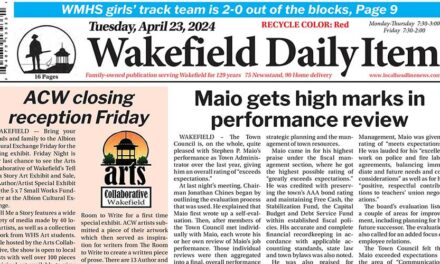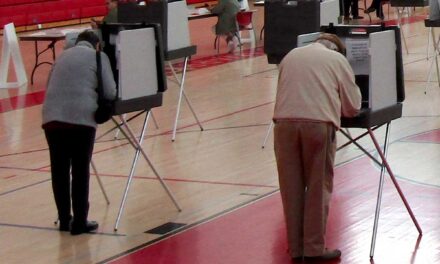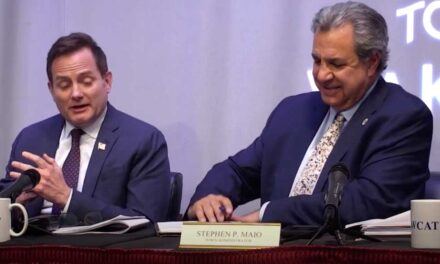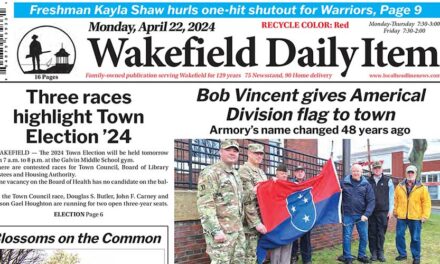This is part of a series leading up to the town election Tuesday, April 26.
By MARK SARDELLA
WAKEFIELD — Every fall, the Board of Selectmen sets the property tax rate. Traditionally, the board has exercised its option to choose the maximum allowable shift to the commercial/industrial class of properties giving residential property owners the smallest allowable share of the tax burden.
The Item asked the five candidates running for three seats on the Board of Selectmen how they would feel about giving commercial property owners a tax break, even if it means that homeowners have to pay slightly more.
Incumbent selectmen Phyllis Hull and Ann Santos as well as challengers Daniel Benjamin, Anthony Longo and Peter May shared their perspectives on the issue of taxation.
Phyllis Hull said that she was adamantly against increasing taxes on homeowners.
“Wakefield has a long and proud tradition of maintaining the lowest possible tax rate for the homeowner, Hull said. “No one has fought harder for the homeowner than I have. As a member of the Board of Selectmen, I will continue to give the residential homeowner the smallest possible share of the tax burden. I would not consider giving commercial properties a break especially if it meant a higher tax rate to the homeowner. Not only would senior citizens on fixed incomes, but also new young families with children buying new homes would find this difficult. These people would have nowhere to go to absorb these increases. Commercial property owners and retailers have the option of raising prices to help absorb their increases.”
Current board chairman Ann Santos also said that she would not favor shifting more of the tax burden onto homeowners.
“I would be uncomfortable shifting the tax burden so the homeowner receives a higher tax rate,” Santos said. “With the debt exclusion for the Galvin, many homeowners are feeling an increase already. Instead of shifting the burden, I think we can be more creative in the benefits we bestow upon our commercial properties to entice them to either move their business to Wakefield and/or to remain in Wakefield. For example, tax increment financing and grants are available for business owners to improve their properties. My hesitation in shifting some of the tax burden to homeowners is certainly related to our seniors on a fixed income, even with the ability for qualifying seniors to access programs such as the circuit breaker relief tax.”
Challenger Dan Benjamin favored continuing the traditional practice of giving the lowest possible tax rate to homeowners.
“I agree with the present tax classification that gives the maximum shift to the residential homeowners,” Benjamin said. “With taxes climbing, the homeowners do not need more taxes. I think commercial/industrial properties have other ways of making up for increased taxes that homeowners don’t have.”
Candidate Tony Longo also said that he would not favor increasing the tax burden on homeowners.
“Shifting the tax burden from commercial to residential does not create any additional tax revenues for the Town – it basically robs Peter to pay Paul,” Longo said. “While I am not in favor in any way, shape or form of higher residential taxes, there has to be a better way to alleviate the higher commercial taxes. Currently, in Wakefield, the residential tax rate is $13.49, the commercial/industrial/personal tax rate is $27.03. The best way to avoid higher commercial/industrial taxes is to create additional revenue by offering property owners tax incentives that ultimately lead to higher revenues to the Town.
“These additional revenues could be used to offset costs for Improvements which have to be done to our schools, specifically the Greenwood, Walton and especially the High School,” Longo added.
Peter May favored continuing the practice of giving residential taxpayers the lowest allowable share of the tax burden.
“At the tax classification hearing every year the board of selectman votes the maximum shift, giving the residential home owners the smallest share of the tax burden, May said. “With the Galvin Middle School we have asked the residents already to pick up an additional financial piece of the tax burden. We should continue this shift in helping the home owners to allow them to have the smallest share of the tax burden. The business community can still be helped with the direction of the town administrator and town assessor to pinpoint specific tax relief and incentives to help those businesses that need some temporary relief for a beautification, structural build out or large maintenance project. We must continue to give the residents the best tax classification allowed.”




